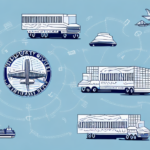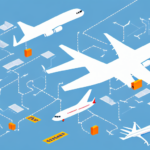Understanding the House Air Waybill (HAWB)
The House Air Waybill (HAWB) is a fundamental document in the air freight industry. Acting as a contract between the shipper and the airline, it serves as both a receipt and proof of shipment. This article delves into the intricacies of the HAWB, highlighting its significance in the shipping process.
What is a House Air Waybill (HAWB)?
A House Air Waybill (HAWB) is a legal agreement between the shipper and the airline, detailing essential information about the shipment. It includes specifics such as the origin, destination, weight, volume, and description of the goods. The HAWB is indispensable for initiating the transportation of goods via air freight.
Importance of HAWB in the Shipping Process
The HAWB ensures that all parties involved are aware of the shipment details, facilitating smooth communication, tracking, and billing. It also includes information about the type of goods, which is crucial for handling items that require special care, such as hazardous materials.
HAWB vs. MAWB: Understanding the Differences
House Air Waybill (HAWB) vs. Master Air Waybill (MAWB)
While both HAWB and MAWB serve as contracts for air shipments, they differ in their issuance and scope. The Master Air Waybill (MAWB) is issued by the airline and covers shipments involving multiple HAWBs. Typically used for international shipments, the MAWB consolidates several HAWBs, each representing individual shipments.
When to Use HAWB and MAWB
HAWBs are generally used for domestic shipments or when dealing with single carriers, whereas MAWBs are preferred for international shipments that may involve multiple carriers and more extensive documentation. Understanding when to use each ensures compliance with industry regulations and smooth transit of goods.
Filling Out a House Air Waybill Correctly
Essential Information Required
Accurate completion of the HAWB is crucial. The following details must be included:
- Shipper and consignee information
- Origin and destination of the shipment
- Weight and volume of the goods
- Description of the goods
- Any special handling requirements
Compliance with Regulations
Depending on the mode of transportation, the HAWB must comply with relevant regulations. For air transport, adherence to International Air Transport Association (IATA) standards is mandatory. Ensuring compliance helps avoid delays and legal issues.
Ensuring Accuracy and Avoiding Common Mistakes
The Importance of Accurate Information
Precise information on the HAWB is vital for categorizing shipments correctly, ensuring safety, and facilitating customs clearance. Errors can lead to delays, increased costs, or even loss of goods.
Common Mistakes to Avoid
- Providing incomplete or inaccurate information about the goods
- Failure to sign and date the HAWB properly
- Omitting detailed descriptions of the goods, their value, and any special handling requirements
Double-check all entries and ensure that the HAWB is legibly filled out to prevent these common issues.
Tracking and Managing Your Shipment
How to Track Your Shipment Using HAWB
The HAWB contains a unique identifier that allows both the shipper and consignee to monitor the shipment's progress. Most airlines offer online tracking services, enabling real-time updates on the status and location of the shipment.
Handling Discrepancies or Issues
If discrepancies or issues arise, such as incorrect information or delays, it's essential to contact the freight forwarder or airline promptly. Addressing problems early can minimize disruptions and ensure the shipment reaches its destination as planned.
Modernizing with Electronic HAWBs (e-HAWBs)
Benefits of Electronic HAWBs
Electronic House Air Waybills (e-HAWBs) are revolutionizing the air freight industry by replacing traditional paper documents. Advantages include:
- Reduced paperwork and administrative costs
- Minimized risk of errors
- Faster processing and transmission
- Environmental benefits through decreased paper usage
Adoption and Future Trends
The adoption of e-HAWBs is increasing globally, driven by advancements in digital technology and the need for more efficient supply chain management. Future trends highlight further integration with digital tracking systems and enhanced data analytics for better decision-making.
Selecting the Right Freight Forwarder for Your HAWB Needs
Key Considerations
Choosing a reliable freight forwarder is essential for the smooth handling of your shipments. Consider the following factors:
- Experience and expertise in air freight
- Reputation and customer reviews
- Range of services offered and specialization
- Compliance with industry standards and regulations
Impact on Shipment Success
A competent freight forwarder ensures accurate HAWB processing, timely shipments, and effective problem resolution, contributing significantly to the overall success of your shipping operations.
The Future of House Air Waybills: Trends and Innovations
Digital Transformation
The future of HAWBs lies in digital transformation, with increasing reliance on e-HAWBs and integrated digital platforms that enhance visibility and efficiency in the shipping process. Innovations such as blockchain technology are also being explored to further secure and streamline air freight documentation.
Sustainable Practices
As the industry moves towards sustainability, electronic documentation like e-HAWBs plays a crucial role in reducing the carbon footprint of air freight operations. Additionally, advancements in sustainable packaging and transportation methods are shaping the future landscape of air shipping.
Conclusion
The House Air Waybill (HAWB) is an indispensable tool in the air freight industry, ensuring the accurate and efficient transportation of goods. By understanding its importance, correctly filling it out, and leveraging modern technologies like e-HAWBs, businesses can enhance their shipping processes. Selecting the right freight forwarder and staying abreast of industry trends further contribute to successful and sustainable air freight operations.






















